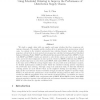Free Online Productivity Tools
i2Speak
i2Symbol
i2OCR
iTex2Img
iWeb2Print
iWeb2Shot
i2Type
iPdf2Split
iPdf2Merge
i2Bopomofo
i2Arabic
i2Style
i2Image
i2PDF
iLatex2Rtf
Sci2ools
132
Voted
MANSCI
2010
2010
Using Scheduled Ordering to Improve the Performance of Distribution Supply Chains
We study a supply chain with one supplier and many retailers that face exogenous endcustomer demands. The supplier and the retailers all try to minimize their own inventory-related costs. In contrast to the retailers’ newsvendor type ordering behavior (under which retailers may place orders freely in every period), we propose two scheduled ordering policies: Scheduled Balanced Ordering Policy (SBOP) and Scheduled Synchronized Ordering Policy (SSOP). Under both SBOP and SSOP, retailers are allowed to order freely only in one period of an ordering cycle, and receive fixed shipments in other periods. However, SBOP is different from SSOP in that, retailers take turns to order freely under SBOP, while under SSOP, all retailers order freely in the same period. With the average supply chain cost per period as the performance measure, we identify mathematical conditions under which the scheduled ordering policies outperform the newsvendor type ordering. Through a large scale numerical stu...
End-customer Demand | MANSCI 2010 | Retailers | SBOP |
Related Content
| Added | 29 Jan 2011 |
| Updated | 29 Jan 2011 |
| Type | Journal |
| Year | 2010 |
| Where | MANSCI |
| Authors | Lucy Gongtao Chen, Srinagesh Gavirneni |
Comments (0)

